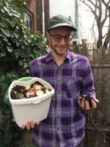Compost Sanitation in Post Earthquake Haiti
httpv://www.youtube.com/watch?v=mAuOHecBxP0 Joe's on fire for this presentation... I wonder if it's because it's for the U.S. Composting Council, and my guess is he has to be sharp for those folks. I wonder how supportive the U.S. Composting Council is of the best composting process you can be involved with...would be fun to write them about it (just did). I wish I had the cover materials available that they do in Haiti... tons and tons of sugar cane bagasse. He has 15 gallon buckets in use here, with the front of the compost toilet open. I fill my 5 gallon bucket pretty quickly and would love to try a 15 gallon. I guess the front is open so you don't have to pick it up as high...might be pretty heavy to…
